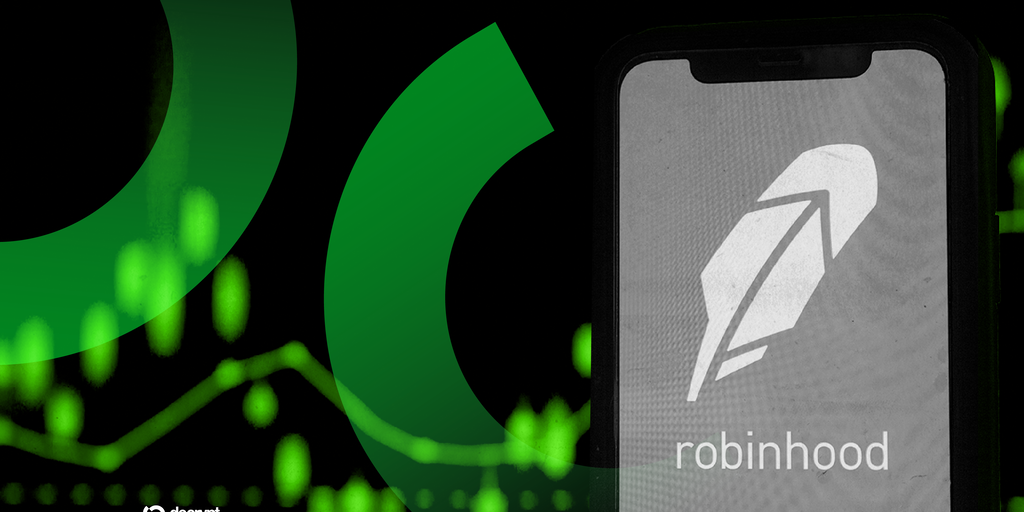In brief
- Robinhood disclosed $989 million in second-quarter revenue.
- Profits rose quarter-over-quarter to $386 million.
- The company’s stock has more than doubled so far this year.
Robinhood posted a stronger-than-expected performance in the second quarter, surpassing analyst expectations yet again this year, despite a cooldown in revenue from crypto trading.
The retail brokerage posted $989 million in total sales, up 45% from a year ago and surpassing analysts’ expectations of $913 million, according to MarketScreener data.
With an earnings per share mark of $0.42, Robinhood reported $386 million in second-quarter profits, up $50 million year-over-year and beating analyst expectations of $276.6 million.
In after-hours trading, Robinhood shares spiked to $110 before settling around $105, according to Yahoo Finance. The company’s stock price has soared 184% year-to-date, outperforming crypto-native competitors like Coinbase, whose shares have jumped 51% to $375 over the same period of time.
Robinhood said that it generated $160 million in crypto trading revenue during the second quarter, a 98% increase from a year ago. However, the figure fell quarter-over-quarter from $252 million, as U.S. President Donald Trump’s trade war dominated headlines.
At the same time, transaction-based revenues for options and equities increased quarter-over-quarter, rising to $265 million and $66 million, respectively. After crypto trading boomed for Robinhood late last year, totaling $672 million in Q4, options-based income has become Robinhood’s main money maker again.
Robinhood’s monthly active users fell quarter-over-quarter to 12.8 million from 14.4 million, indicating traders grew less engaged as Trump’s efforts to reshape global trade through “reciprocal” stoked weeks of economic uncertainty.
Robinhood began supporting crypto in 2018, but the company has leaned into regulatory tailwinds under the current administration and is augmenting its business model using the technology as it tries to grow its footprint abroad.
Robinhood is developing its own Ethereum layer-2 scaling network to support tokenized assets, and it is being modeled on Arbitrum, a popular Ethereum layer-2 scaling network.
Although the company’s rollout of so-called stock tokens provoked backlash from firms like Chat GPT maker OpenAI, CEO Vlad Tenev told Decrypt last week that it’s a “big milestone,” and the company plans on expanding the product to cover more companies.
“I think tokenization is the biggest innovation in capital markets in over a decade,” Tenev said during an earnings broadcast. “Stock tokens will do for stocks what stablecoins did for fiat currencies.”
The company’s stock price jumped to a record high of $113 in June, not long after it unveiled tokenized stock trading for customers in Europe and its own blockchain network. At the same time, Robinhood unveiled perpetual futures trading, mirroring popular crypto exchanges.
Last year, the company acquired Luxembourg-based crypto exchange Bitstamp. In May, the company said it would acquire WonderFi, a Canadian crypto exchange backed by Shark Tank personality Kevin O’Leary.
Robinhood has sought to compete with prediction markets like Kalshi and Polymarket by offering event contracts. Tenev noted that trading volumes for event contracts doubled quarter-over-quarter to nearly $1 billion in the second quarter.
In a shareholder presentation, the company noted that it has $4 billion in cash, investments, and stablecoins, alongside $3.8 billion in available lines of credit. The firm said it will continue to look at mergers and acquisitions as a way to maximize shareholder value.
UPDATE (July 30, 2025, 4:33 p.m. ET): Adds information about options trading performance.
UPDATE (July 30, 2025, 6:37 p.m. ET): Adds information about monthly users, prediction markets and Tenev quote.
Daily Debrief Newsletter
Start every day with the top news stories right now, plus original features, a podcast, videos and more.







